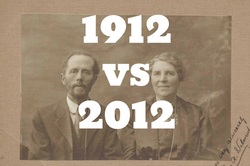 Symbol for an RSS feed Symbol for an RSS feed I discovered RSS feeds quite by accident. I thought an RSS feed was a news strip that flashed recent news updates at the bottom or the top of your computer screen, much like what we now see on TV news channels. Then I got Mac. I was playing around with it when I figured out how the whole RSS thing works: 1. When you see the RSS sign on any website, if you click on it you're given a feed url. 2. You insert this url into a feedreader and every time that blog or news site produces a fresh article you get an update via your feedreader! On Macs the mail app has an in-built feed reader that you can paste urls into. This is fabulous because: a) You don't have to give your email away but you get the news straight to your inbox. b) When you don't want to be subscribed to that feed anymore you can just delete it in one click. c) It's easy, fast and just as cheap as email plus you don't need to fill in forms etc. d) If you have a business listed on LinkedIn, there's a spot there for a feed url so your blogs can be posted straight to your Company's LinkedIn profile with no extra work on your part. I use weebly to build my websites and with them adding/creating RSS feeds is easy peasy. e) If you have a business you'll capture people that prefer RSS to email. So - if you haven't got a feedreader try one of these: I was rather disappointed to discover that the top two newspapers in Malawi don't have an RSS url. This is shocking because you'll hardly every find a news site without this form of news syndication. As a result I was only able to add a feed for Nyasa Times to Chichewa101.com/malawi.
0 Comments
 I'm currently reading A Short History of Nearly Everything by Bill Bryson and realising that there are many practices that we now think of as new that are actually darn old: 1. Self publishing Lots people that wrote books self-published them or funded the printing in days gone by. Some lost a fortune as a result. What we now accept as the "traditional" publishing system actually replaced self-publishing and we've now come full circle. 2. Working past retirement Most people stopped working when they died or when they simply didn't have the physical capacity to. This was especially true amongst the educated classes - they worked for the joy of working and discovering new things. They were many tinkerers. Seeing retirement as a time when you completely stop work and get paid money anyway only came in post-world war 2. Regulators decided it was humane and fitting for the "civilised" world to give the elderly a break. It's an ideal situation that is in fact completely untenable. To support retirees you would need an ever increasing class of working people; with the decline in both birth rates and death rates this won't happen. 3. Working from home Many scientists in the old days worked from home. I imagine they rolled out of bed at 5:00 or 6:00 a.m. and continued where they'd left off the night before. Now we're trying to revert to this old way of working - funny. Admittedly, you will find that many early scientist came from privileged backgrounds and were unbound by the need to earn a living wage. 4. Being a jack of all trades A lot of entrepreneurial literature talks about how the ease of technology means the same person can do lots of previously "specialised" tasks. This is true but people in the olden days didn't specialise either. They didn't have the advantage of all this technology we now have but they all dabbled in a multitude of trades. If you look at profile of distinguished people of old you'll frequently see "Biologist, Chemist", "Writer, Geologist". Amongst the writers you'll find many people that wrote books on very different topics - "Economics, Psychology, Beauty". On the other hand business schools also espouse the benefits of focusing on just one business. Personally, I think the idea that you'll do better if you just stick to one thing is complete rubbish. If you've got four start ups on the go because you simply want to make money you'll probably fail. If you've got four start ups because you're passionate about all them and are committed to consistently producing some output for all based on a focused schedule - that's a successful result in itself. Next time you're confronted with a new idea, know that it might just be an old idea coming back.
|
Archives
December 2015
Categories
All
By Heather Katsonga-WoodwardI'm always thinking, debating, considering and revising my views - some of those deliberations will be shared right here. |



 RSS Feed
RSS Feed
